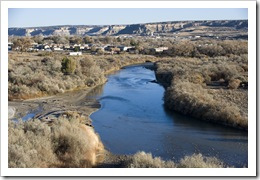
Last week when we hit the 100th coal-fired plant abandoned or prevented in the U.S., someone asked me, “What’s next?”
My answer came quickly: “It’s time to stop the next 100.”
And so with that we’ve just launched a new campaign to persuade the Blackstone Group to invest in clean energy instead of dirty coal. One of the 10 largest private equity firms, Blackstone now has more proposed coal-fired power plants than any other company in the U.S. Joining us in the campaign are a coalition of community groups, tribal organizations and student groups.
Two of Blackstone’s proposed coal plants, the Desert Rock project in New Mexico and the Toquop plant in Nevada, were intended to sell power to California. But new laws passed in that state now prohibit imports of dirty coal power, and the largest utilities in both Nevada and Arizona have said flatly that they don’t see a future in coal and that efficiency and renewables now make more sense for their customers.
Blackstone’s investment in a fleet of new coal-burning plants (three planned by Blackstone subsidiary Sithe Global) will do nothing for investors but create dead weight, while unnecessarily incurring huge health and environmental risks on the communities where they will be located, said the groups.
Communities where the company’s plants would be built are strongly opposed to the projects, and they also say the companies have ignored their concerns.
“Any new coal plant here would have a dramatic impact on our quality of life, and they will cause problems our children will have to face,” said Mesquite Mayor Susan Holecheck, whose city sits less than 30 miles from the site of the proposed Toquop plant.
“We’ve tried talking to them about these issues, to tell them there’s a far better way for both them and us, but our pleas have largely fallen on deaf ears.”
She said the residents of Mesquite and surrounding areas would love to have the jobs and revenue, something that is achievable without sacrificing their quality of life.
“Why wouldn’t Blackstone invest in renewable technology in sun-baked Nevada?” Holecheck said. “They make their investors money, bring economic development to the region, and in the process protect our community for us and for our children.”
Navajo communities have also been already impacted by a ring of existing coal plants, including the Four Corners, San Juan and Navajo plants. Desert Rock will add insult to injury, and a better investment on the Navajo Nation requires good community consultation on renewable energy projects that would not harm air or water quality.
Financially, Blackstone is continuing the coal industry’s trend of looking for loopholes and handouts. In Pennsylvania, even though the state granted Blackstone $600 million in tax exempt bonds for its remaining proposed plant there, the company is seeking additional federal loan guarantees after private investors refused to finance the risky project.
Add to this carbon regulations, which are currently being debated on Capitol Hill, and the wealth of economic reports highlighting the financial risks of coal, and Blackstone’s decision to pursue a new fleet of coal-fired power plants quickly becomes unacceptably risky — both for investors and for the general public.
“All three of Blackstone’s coal plants are expensive, unnecessary, and financially risky — just like every other proposed coal plant in the country,” said Mark Kresowik, Corporate Accountability Representative for our Beyond Coal Campaign. “Blackstone should stop pouring money into developing projects that investors and communities don’t want, and help create family-supporting jobs with clean energy instead of dirty coal.“
You learn more the campaign and get involved by visiting www.noblackstonecoal.com

